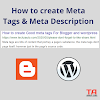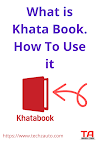How to create Good Meta tags and Meta Description For Blogger and WordPress or website with easy steps
Meta Tag Definition: Meta tags are bits of content that define a page's body; the meta tags don't show up on the page itself, however just in the page's source code
What Are Meta Tags and Meta descriptions?
Meta tags are bits of content that portray a page's body; the meta tags don't show up on the page itself, however just in the page's source code. Meta tags are basically minimal substance descriptors that assist tell with looking through motors what a website page is about.
The main contrast between tags you can see (on a blogpost, state) and tags you can't see in the area: meta tags just exist in HTML, for the most part at the "head" of the page, as are just noticeable to web crawlers (and individuals who realize where to look). The "meta" means "metadata," which is the sort of information these tags give – information about the information on your page.
Meta tags definition, title tags, and meta descriptions?
Title tags and meta depictions are bits of HTML code in the header of a website page. They help web crawlers comprehend the substance on a page. A page's title tag and meta description are normally indicated at whatever point that page shows up in web crawler results. (We'll take a gander at certain instances of this later.)
Elegantly composed and convincing meta tags can pull in more clients to snap to your site from the web crawler results.
The Title tag (Meta tags and Meta Description)
The title tag is the title component of a site page that sums up the substance found on a page. It will show up in three key spots: programs, web crawler results pages, and outer locales, for example, Facebook or Twitter. We'll take a gander at instances of title tags later.
There's one significant thing to remember. Web indexes expect a titles tag to incorporate pertinent catchphrases and expressions that portray what that page is about. So if the title you make isn't important for the page, Google can decide to show an alternate title. You don't need that to occur. Why? Since title tags are an extraordinary chance to pull in possibilities to navigate to your site so ensure it gives a precise, brief, and possible outline of what that page is about.
Some e.g.
This is what it looks like in the internet searcher results:
Do Meta Tags Help SEO? (Meta tags and Meta Description)
Meta tags and SEO Truly, they do, yet not every one of them and not constantly. One of the objectives of this page is to clarify which meta tags can possibly help your SEO rankings and which have for the most part dropped out of utilization. (See Know Your Meta Tags beneath).
On the off chance that you need to see if a given page is utilizing meta tags, perfectly click anyplace on the page and select "View Page Source."
Another tab will open in Chrome (in Firefox, it'll be a spring up window). The part at the top, or "head" of the page, is the place the meta tags would be.
Achieve Your Meta Tags (Meta tags and Meta Description)
There are four significant kinds of meta tags worth thinking about and we'll discuss them all here. Some are not as helpful as they used to be. Others merit utilizing normally, and will probably build your traffic by telling Google what your identity is and what you give. (There are multiple sorts of meta tags, yet some are less normal or not applicable to web advertising).
The four kinds we'll examine here are: meta tags for search engines, meta tag description
- Meta Keywords Attribute - A progression of watchwords you regard pertinent to the page being referred to.
- Title Tag - This is the content you'll see at the highest point of your program. Web indexes see this content as the "title" of your page.
- Meta Description Attribute - A short depiction of the page.
- Meta Robots Attribute - A sign to internet searcher crawlers (robots or "bots") regarding what they ought to do with the page.
Meta Keywords Attribute (Meta tags and Meta Description)
Meta Keywords are a case of a meta label that doesn't bode well to utilize nowadays. Quite a while back, the meta catchphrase tags may have been gainful, yet not any longer.
Recall kindergarten and when your instructor gave you a harsh look and said "on the off chance that you can't quit utilizing those colored pencils while I'm talking, I'm going to remove them from you," and you didn't tune in and, to your stun, they were surely removed? That is kind of what Google did with meta watchwords.
Quite a while back, advertisers excited for online visits would embed watchwords absolutely inconsequential to their pages into their code trying to privateer traffic from the more mainstream pages.
Those that really was about Lindsay Lohan, or whoever was then drifting. This was known as "catchphrase stuffing." Google inevitably got shrewd to this and chose at long last to downgrade the apparatus.
Nowadays Google doesn't utilize meta catchphrases in its positioning calculation by any means since they're too simple to even consider abusing.
Title Tag and title tag examples (Meta tags and Meta Description)
Title tags, then again, are the most significant of the entirety of the meta tags talked about here. These tags really affect search rankings and, maybe similarly as critically, are the just one of the tags we'll talk about here that are noticeable to the normal client. You'll see them at the highest point of your program (for natural quest pages or for PPC greeting pages):
Meta Description Attribute and sample meta description (Meta tags and Meta Description)
The meta portrayal is a valuable meta tag as, basically, it discloses to web search tools and (here and there) searchers themselves what your page is about. Suppose you were googling the expression "meta watchwords" for instance. You may experience the accompanying outcomes:
It's essential to take note that the meta portrayal tag won't generally appear in the outcomes for a Google search (Google regularly picks a piece of content from the page itself) however it's valuable in different ways.
Google has additionally expressed that catchphrases in meta depictions won't influence your rankings. In any case, a convincing meta portrayal tag could tempt searchers to navigate from the SERP to your site.
particularly if the depiction incorporates the watchwords they were looking for. Furthermore, a solid active visitor clicking percentage from the SERP could in a roundabout way improve your rankings.
Google's reasons are fairly strange, yet their activities talk boisterously: meta catchphrases don't make a lot of difference any longer, yet meta depictions definitely do.
Meta Robots Attribute -page title and meta description (Meta tags and Meta Description)
With this trait, you're guiding the web crawlers with your pages:
- record/noindex - This advises the motors whether to show your page in list items or not.
- follow/nofollow - This guides the motors with joins on your pages: regardless of whether they should trust and "follow" your connections to the following page or not.
So What's Next? (Meta tags and Meta Description)
We've discussed the manners by which meta tags can have an undeniable effect on web crawler promotion. In outline:
- The Title Tag alone can affect your web index rankings.
- Elucidating tags may urge clients to visit your site.
- The meta portrayal may fill in as "natural advertisement content."
- Meta watchwords are expostulated by most web indexes.
How to Generate Meta Tags and How to use Meta tags generator
HTML Code Download -
 |
| Download |
Please don't forget to Like, Share, Comment, and Subscribe to our Tech Auto Channel for more videos.
Visit Our Website -https://www.techzauto.com
This video is in the Hindi language.
यह वीडियो हिंदी भाषा में है-
Our channel provides tech and support information about Automotive, android phones, SEO, blogger, WordPress, digital marketing, youtube, etc.
To connect with us and learn more and more.
please
Share, Support, Subscribe!!!
https://www.youtube.com/techzauto
When composing title tags: Meta tags generator
• Title must be profoundly pertinent to the substance found on that particular page.
• Place significant watchwords and expressions near the front of the title tag so they grab the attention.
• Write normally for guests and keep away from watchword stuffing.
• Avoid duplication. Each page will have an alternate subject so it needs to have a one of a kind title.
• Potentially incorporate your image name toward the finish of the title tag, yet center around conveying the desired information first.
• Keep it somewhere in the range of 60 and 64 characters or the same number of characters as you can fit into a 512-pixel show. In the event that you compose a title that is longer than that, it'll get cut off, demonstrating an ellipsis
• Make it convincing. Your title tag ought to be sufficiently engaging to tempt guests to snap to discover increasingly about what you bring to the table.
When composing meta depictions and how to use meta keywords
• Have one of a kind depictions for each page on your site.
• Create a convincing portrayal utilizing significant watchwords. Ensure what's depicted is the thing that the searcher will get.
• Inspire interest. Give simply enough data to clarify what the page is about however less that it ruins the interest factor.
• Include a source of inspiration inside your meta portrayal to give your peruser and away from what moves to make and how this might benefit them.
• Keep your meta portrayals somewhere in the range of 150 and 154 characters. On the off chance that they're excessively long, web indexes will remove the additional characters.
A note on length, meta tag analyzer (Meta tags and Meta Description)
Despite the fact that we've given an unpleasant range to the length of title tags and meta tags.
The fact of the matter is more unpredictable than that as Google utilizes pixel size as opposed to character length to choose the amount to show.
Hence, it's a smart thought to test your titles and portrayals utilizing an apparatus, for example, this one from To The Web.
How would I pick the correct keyword? (Meta tags and Meta Description)
The catchphrases or watchword states that you use in your title tags and meta tags should be pertinent to the substance on a page. So on the off chance that you have a point of arrival where you promote wedding solicitations, take a stab at utilizing catchphrases like "exquisite wedding solicitations" or "modest wedding solicitations"
If you liked what this post is or got to learn something about "How to Create terms and Conditions page for website or blog", please share this post to Social Networks such as Facebook, Twitter, and other Social media sites.









0 Comments
Please do not enter any spam link in the Comment Box